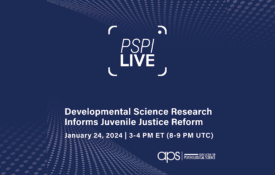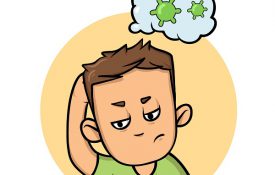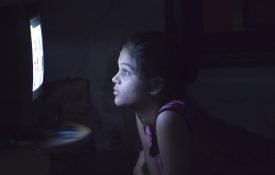
Many parents ponder why one of their children seems more emotionally troubled than the others. A new study in the United Kingdom reveals a possible basis for those differences.

In a January PSPI Live webinar, authors of a forthcoming article came together to discuss juvenile justice reform.

Youth who are caught committing crimes are far less likely to reoffend when they receive rehabilitative help, such as therapy and life-skills training, rather than a legal punishment. Learn more about the new PSPI report and what bringing systems and science to find solutions could do to help young people.

Early deprivation experiences, such as parental neglect, appear to be more closely associated with cognitive and emotional functioning in adolescence than early threat experiences, such as exposure to abuse.

Depression may be more closely related to how we perceive our relationships and position within a community than to whether or not we are socializing with others.

To speak about self-injury and how online communities might help, Emma Preston, an APS member and graduate student at the University of Southern California, joined APS’s Ludmila Nunes.

Spanking at age 5 is associated with increased behavior problems 1 and 3 years later -- an increase that cannot be attributed to characteristics of the child or the family environment

A longitudinal twin study suggests that victimization makes general and far-reaching contributions to mental disorders.

APS President Alison Gopnik discusses the increasing amount of scientific evidence that our experiences as children shape our adult lives.

Children who experience early-life stress and abuse are at risk of a wide spectrum of later disorders and symptoms, including depression.

New research associates early life adversity with the presentation of social anxiety disorder later in life.

Expert commentary from Vanessa LoBue on emotional development and the effect of emotion and experience on perception and learning. [April 1, 2020]

While the amount of exposure to disaster coverage on TV can impact children's well-being, their preexisting symptoms of posttraumatic stress also play an important role.

Cell phones and social media can help teens cope with stressful events—as long as they strike the right balance between spending time online and pursuing other coping activities.

Supportive parenting can help protect adolescents, and their brains, against the long-lasting impact of growing up in poverty.

Adults may "explain away" symptoms of childhood disorders that present in an otherwise positive environment.

Children often show remarkable resilience, but survey data shows that repeated exposure to adversity in childhood can have a significant impacts on health and well-being later in life.

The intense exhaustion of parental burnout can lead parents to feel detached from their children and unsure of their parenting abilities.

A one-time intervention that educates teens about the changeable nature of personality traits may prevent an increase in depressive symptoms often seen during the transition to high school.

A unique longitudinal investigation of Major Depressive Disorder tracks the illness across four critical periods in life, providing new insights into how depression emerges and develops over time.
